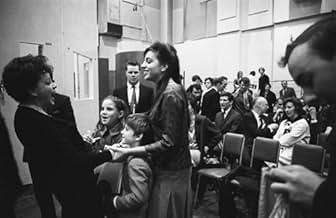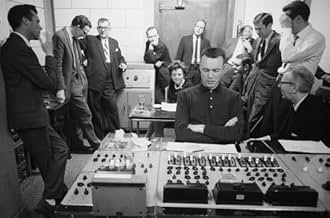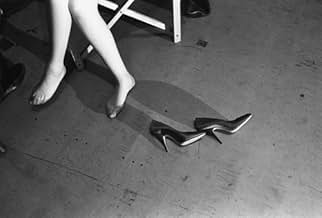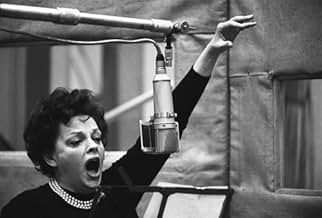Füge eine Handlung in deiner Sprache hinzuJenny Bowman is a successful singer who visits David Donne to see her son Matt again, spending a few glorious days with him while his father is away in Rome in an attempt to attain the famil... Alles lesenJenny Bowman is a successful singer who visits David Donne to see her son Matt again, spending a few glorious days with him while his father is away in Rome in an attempt to attain the family that she never had.Jenny Bowman is a successful singer who visits David Donne to see her son Matt again, spending a few glorious days with him while his father is away in Rome in an attempt to attain the family that she never had.
- Regie
- Drehbuch
- Hauptbesetzung
- Backstage Parent
- (Nicht genannt)
- …
- HMS Pinafore Audience
- (Nicht genannt)
- …
- Theatre Audience
- (Nicht genannt)
Empfohlene Bewertungen
Have always her an amazingly gifted singer with a beautiful voice and near-unsurpassable emotional connection to everything she sings and she to me was a good actress (especially in 'A Star is Born', 'The Wizard of Oz' and 'The Clock', though have really liked/loved her in everything seen of hers and have found a lot to admire for everything seen in films she stars or features in).
'I Could Go On Singing' is her last film and her swansong, and while Garland does not disappoint by any stretch of the imagination (she is the reason for seeing the film) she did deserve a better final film. 'I Could Go On Singing' is far from bad certainly and has a good deal to admire, but considering the potential and how great its strengths are it is a shame that it wasn't any better.
Due to Garland's illnesses, the film was finished in a hurry and it does show at times in some rushed-looking production values. Pacing is 'I Could Go On Singing's' biggest issue, with some all too obvious padding especially in the interminably self-indulgent "London travelogue" shots used to make up for when Garland was unavailable to film, those parts especially looked scrappy and should have been cut. The script is uneven, some of it genuinely moving and charming others (and too frequently) daft and melodramatically soapy, especially Dirk Bogarde's.
However, 'I Could Go On Singing' is mostly attractively photographed and the London Palladium stage gives an appealing sense of nostalgia. The music and songs are wonderful, especially the powerfully staged and performed "By Myself", the equally heartfelt "It Never Was You" and the rousing "Hello Bluebird".
In terms of standout scenes, the hospital waiting room scene, done in a single take, is particularly fine. It is a painfully honest and heart-breakingly honest scene and one of the greatest examples of improvisational acting on film personally seen, up there with the egg breaking scene in 1962's 'Cape Fear'. Ronald Neame directs admirably and there is enough that is powerful, entertaining and poignant.
Garland is the best asset other than the music, she is simply sensational and while it may not be her best performance it's to me one of them. She is especially good in the songs and in the hospital waiting room scene where the real her comes out in her character and it is startling in how real it feels and looks. Dirk Bogarde is very good as well, as are Jack Klugman, Aline McMahon and a sympathetic Gregory Phillips.
All in all, a good film with a significantly greater lead performance. 7/10 Bethany Cox
Here, Garland plays Jenny Bowman, a famous performer who comes to London with a manager (Jack Klugman) and an assistant (Aline McMahon) to do concerts and goes to see an ex-beau, Dr. David Donne (Dirk Bogarde) with a faux medical problem. He knows she has an ulterior motive. The two of them had broken up, but later, Jenny gave birth to their son. The newlywed David and his wife adopted the child because Jenny couldn't really handle carrying for a new baby and having a career. Matt never knew and believed that both David and his wife were his adopted parents. Jenny claims that now that David's wife is dead, she just wants to see her son (Gregory Phillips). Once she sees him, she wants to spend time with him - it spirals out of control.
Despite its soapy plot, "I Could Go ON Singing" manages to be very effective for two reasons: Judy Garland and Dirk Bogarde, both of whom lift this film up from the maudlin. Bogarde is an uncredited writer on this film, contributing a lot of Garland's dialogue, as the script needed work before she could take the role; he often participated in screen writing on his films.
Garland plays her role as a brilliant talent who is a needy woman, but one who also is used to getting her way and knows what she wants. Despite an outer fragility, she knows how to stand up for herself. As an entertainer, she is second to none - magical, warm, exciting, passionate, and fun. Garland sings the title song plus "By Myself," "It Never Was You", and "Hello, Blue Bird," all beautifully performed. Garland looks petite and wonderful as well.
During the scene in the hospital, in which David comes to see Jenny after she sprains her actor, the director, Ronald Neame, realized as the camera was rolling that the scene had passed out of the movie and into real life. Garland was no longer Jenny but Garland. There was an incredibly intense atmosphere in the room, so instead of yelling cut, doing another take, and repositioning the camera, he let the scene go on. Normally a scene like that would take all day to film. Bogarde realized that Neame wasn't going to stop and even altered his dialogue to respond to her. The result is an incredibly moving, very personal scene.
Bogarde gives a low-key performance and is perfect opposite Garland, very British, attempting to keep his emotions even -- a very generous actor who was also helpful to Neame in keeping Garland going. There were a great many difficulties on the set, including an incident where a plate of food went flying through the air as Judy demanded director Henry Hathaway. In the end, they all made it through, and the result is successful.
We have lots of examples on the screen and in recording of Judy Garland's tremendous talent and brilliance. "I Could Go On Singing" is a look at a character very close to Garland and gives a good sense of the real woman. Art imitates life, or did life imitate art - with Garland, one never knows.
Garland's character, Jenny Bowman, is a thinly disguised self-portrait, down to the fluttery neurotic mannerisms (with hints of pill-popping) and the ability to turn around an audience kept waiting an hour past time for her show at the London Palladium- where Garland had sensationally headlined in 1960. After "A Star is Born" Garland, cheated of her rightful Oscar, had withdrawn to concerts and cabaret for almost a decade except for "A Child is Waiting" and her overheated cameo in "Judgement at Nuremberg". Here, for the last time, she essays full-blooded emotional acting against a worthy British opponent (for James Mason, think Dirk Bogarde) and carries it off pretty well, never becoming tiresome and often laughing at her own overwrought persona. She still looks pretty, too, not quite overwhelmed by the blowsiness of her last few years.
Bogarde, rapidly maturing after his daring role in "Victim", is a superb, challenging foil. Watch how he turns on a sixpence from the surgeon to the ex-lover after reassuring Garland that her throat is okay. His buttoned-up Britishness is never dull; like Ronald Colman, he radiates reliability and sensitivity in a coherent combination. He claimed to have rewritten all his dialogue with Garland during shooting; certainly their exchanges have a cut and thrust which prevents her from chewing the scenery. She has to react as well as posture.
The fans are given generous dollops of Garland's act in between plot scenes, but these reasonably complement and underscore the themes of defiance and sacrifice. Yes, it's soapy and lush, with daft interludes like the helicopter flight over London. But a touch of Limey stiff upper lip takes the saccharine taste away, and the Ronald Neame of "Tunes of Glory" and "The Poseidon Adventure" knows how to keep a story rolling along. File with contemporary efforts such as "The VIPs" and "The Yellow Rolls-Royce" as an enjoyable wallow, to be taken with boxes of paper handkerchiefs and chocolates.
Credit goes to a sincere, straightforward screenplay with some tart dialogue for Judy that sounds as if it came from her own true life experiences. Indeed, there are backstage stories that Judy and Dirk worked on the screenplay to tighten the emotional force of the drama and punch up the lines a bit--and if so, they have succeeded brilliantly.
Not only entertaining as a dramatic showcase for Miss Garland, it is also highly recommended for the musical interludes during which she performs at the London Palladium in great arrangements of material like "Hello, Bluebird!", "By Myself" and "I Could Go On Singing", among other melodies, all in full control of her "vibrato in search of a voice" equipment.
As a swansong for the actress, it is incredibly moving and a tribute to both Garland and Bogarde. Bogarde is especially intense in his emotional scenes--reminding me somewhat of the brooding character he played so well in LIBEL (a courtroom drama with Olivia de Havilland). He had become a mature actor by that time and here he is even more impressive.
The story tells of an American singer, Jenny Bowman who comes to London for a sold-out series of concerts. She longs to see her illegitimate son Matt (Gregory Phillips) whom she left with his father, Dr. David Donne (handsome Dirk Bogarde) years before to pursue a career. Matt, unaware of who Jenny really is, is taken under her magic spell much to David's chagrin. Jenny becomes attached to Matt and undergoes a lot of trauma as she seeks to pursue her way back into David's life in order to become Matt's mother at last.
The obvious Madame X story could be an instant turnoff for those who are sickened by sappy dramas like this, even the best ones of the 30's and 40's.
However, Judy takes this beyond possible Ross Hunter soap opera twists and turns it into a one-woman show where she gave movie audiences a chance to see what she had been doing live on stage since her MGM years ended 13 years before. The excitement builds with Jenny's manager George (a young Jack Klugman) helping to build up her excitement and the audience's enthusiastic rise to their feet when she makes her first entrance. Matt's smile as she begins to sing is one that must have crossed many a young man's face during this era, particularly the gay fan base Judy had been building up during the past 10 years. His earlier performance in drag in a production of "HMS Pinafore" could have come off as camp (especially when he introduces Judy to one of his co-stars as "One of the Pinafore's best top men"), but fortunately, his youth kept him from looking like a female impersonator.
Each of Garland's numbers are carefully staged with her outfits matching the backdrops, yet not blending in. Particularly dramatic is Garland's rendition of "By Myself", a Fred Astaire tune from "The Bandwagon". In a flaming sequined red dress (and an equally fiery mood), Garland unleashes all the passion of her performance. One solo ballad, "It Never Was You", is reminiscent of "Friendly Star" from her last MGM movie, "Summer Stock", done in a way which proves Judy could sing any type of song. "Hello, Blue Bird" is a companion tune with "Over the Rainbow", done in a subtle shade of blue, indicating that maybe Dorothy did find where those happy little blue birds fly. She sings the title song over the credits and in the rousing finale.
Dirk Bogarde gets second billing, but doesn't appear as much as the sweet looking Gregory Phillips, then 14 years old, just a few years younger than Judy's daughter Liza. Bogarde and Garland do have some great scenes together, but lack the chemistry of Garland and her previous British co-star, James Mason. Phillips' excitement in the concert scenes is most believable, and he works well with the great lady of song. Following his Broadway experience with another great entertainer, Ethel Merman in "Gypsy", Jack Klugman does well as Garland's patient agent, George; It would be almost another decade before he found lasting fame on TV as part of "The Odd Couple" and later "Quincy". In the confrontation scenes with Garland, Klugman is outstanding. The small role of Ida, Garland's wardrobe lady, is played by the wonderful stage and screen actress Aline MacMahon, a tall lanky character performer who once had the opportunity for screen stardom but preferred the more real characters she ultimately played. (See her as one of the wisecracking "Gold Diggers of 1933" as well as one of the many kind hearted characters she played during her Warner Brothers days; You will see what a lovely performer she was, and the chance to appear with Garland was an excellent way to top her career.)
It is a shame that this film came and went. It probably did very well in cities such as New York, Los Angeles, and San Francisco, where Judy's gay audiences flocked to see it, but probably failed in smaller areas where audiences wanted to remember Judy as Dorothy and not see her as a troubled adult with a scandalous past (much like herself). Sometimes its hard to tell where Judy ends and Jenny begins, but life is not imitating art here; She is only playing several aspects of who Judy was. Yes, she could be trouble (as Dirk Bogarde would reveal about her behavior on the set), but many people (Dirk included) would admit that when she did deliver, the magic she gave was worth the trouble. Jenny comes off as a troubled woman filled with the love for her audience that Judy indeed had, and an almost unfullfillable need for love from those immediately around her. There is a pain in Judy's eyes that comes out in the character that makes you wonder if she wasn't feeling pain inside from playing part of her own life. Yet, there is a humor that shows the survivor side as well, something Judy could portray as well. Both Jenny and Judy were very complex women, and Judy's ability to play that side of her without coming off as self-parody is a performance that was more than deserving of Academy Award consideration. It is that performance which takes away some of the clichés of an old formula and makes it fresh and moving.
Wusstest du schon
- WissenswertesOfficially regarded as her final film before her death in 1969, Judy Garland filmed it immediately after making Ein Kind wartet (1963) though Bretter, die die Welt bedeuten (1963) was released first. At the time of filming, Garland was going through an ugly child custody battle of her own with her soon-to-be-divorced husband, Sidney Luft. The opportunity to make a film in England with Sir Dirk Bogarde, an actor and friend she had long admired, provided the perfect escape from her problems at home but unfortunately Garland carried her troubles with her across the Atlantic.
- Zitate
Jenny Bowman: You think you can make me sing? Do you think you can - do you think George can make me sing? or Ida? You can get me there, sure, but can you make me sing? I sing for myself. I sing when I want to, whenever I want to, just for me. I sing for my own pleasure. Whenever I want - do you under stand that?
- VerbindungenEdited into Chop Suey (2001)
Top-Auswahl
- How long is I Could Go on Singing?Powered by Alexa
Details
- Erscheinungsdatum
- Herkunftsländer
- Sprache
- Auch bekannt als
- I Could Go on Singing
- Drehorte
- Produktionsfirma
- Weitere beteiligte Unternehmen bei IMDbPro anzeigen
- Laufzeit1 Stunde 40 Minuten
- Farbe
- Seitenverhältnis
- 2.35 : 1
Zu dieser Seite beitragen






























